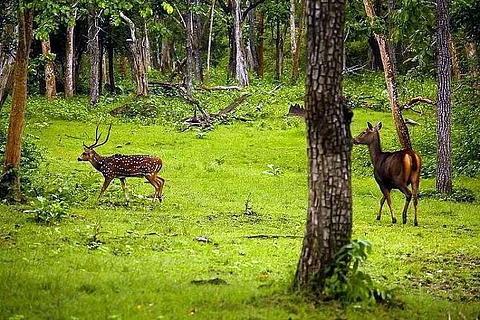

The Karnataka government is toying the idea of having private wildlife reserves alongside existing reserved areas or national parks. And this has left many environmental activists in the state worried.
On the face of it, the new Karnataka Private Conservancy Rules wants to give private persons, (only those owning at least 100 acres of land adjoining to notified forests) permission to create private forests. The purpose of this, the government says, is to establish a safe corridor for wild animals between two forest areas.
According to The New Indian Express, the draft of The Karnataka Private Conservancy Rules, 2018 states that only 5% of the land can be used for building hotels or resorts, the rest of the area has to be kept for the flora and fauna. At the moment, the draft rules are not public, raising further suspicion on minds of wildlife enthusiasts.
Under existing rules, only farming and horticultural activities are allowed within 10 kilometre surrounding forest land.
The draft rules propose all existing forest, wildlife, and environmental laws will apply except for permitting tourist activity. The draft rules also suggest that in case of untoward incidents, no compensation will be given by the government and the resort owner will be held responsible.
Private forest areas are common in South Africa and Zimbabwe but many wildlife enthusiasts in Karnataka are of the opinion that these are not feasible under local conditions where there is rampant encroachment and irregularities. Even notified forest lands have not been spared.
They fear this would eventually lead to further encroachment of protected forest areas and also potentially increase chances of man-animal conflicts.
Not only activists, even some senior state forest department officials are firmly opposed to the move stating that this will only benefit the rich and the powerful while small-scale farmers won’t be benefited.
A senior officer from the department told TNM that prima facie the draft rules seem to be a way to circumvent existing rules and Supreme Court orders on conserving eco-sensitive zones.
“At the most, we can experiment and join some corridors like between Brahmagiri and Nagarhole where there is an estate. Maybe, that will perhaps be of use and enable free movement of animals. But then if this is done all around, then rich people can buy 200 acres of land, and plant some trees and ask permission to build resorts. This is not advisable at all. This seems like a circumvention of rules. We cannot make this as a policy,” the senior officer said.
“Some politicians or their benamis own large parcels of lands adjoining protected areas, once owned by small farmers. But after these areas were notified as eco sensitive zones, they are not able to use these lands commercially. This new law is to legalise the existing regulations on land usage adjoining protected areas by the people in power,” an ecologist who has knowledge of the draft ruled told TNM on conditions of anonymity.
“Suppose a big resort is set up over five acres, and a lot of people come there, what will be the effect on wildlife? How safe is it to hold the private sector responsible for elephant corridors or places where there are recurrent man-animal conflicts?” the person added.
Moreover, many feel infrastructural work in these eco-sensitive zones will inadvertently disturb existing wildlife.
According to sources, the idea was first proposed in 2016, and there were inter-departmental discussions.
“Last year the proposal came up within the department, and then it went to Law and Parliamentary Affairs department. Once it came back, many of us said that there is a need for open discussions on this as things were done in an opaque manner,” the forest officer added.
The officer added that to implement the rules, which are full of loopholes, will be difficult given that existing government managed forest cover in the state is shrinking year after year.
Another eco-conservationist volunteer termed this as a “matter of shame”.
“They are inviting builders, resort owners, coffee sellers to own private forests because some minister has his land around the forest. The new draft has to come to public domain before it is notified. This is a scary scenario where the resort owner is made responsible for the safety of wildlife.”
However, another IFS officer of Deputy Conservator of Forest rank, said that regardless of the loopholes in the existing draft, it needs to be explored stating it is “much more practical”.
“We know what is happening in Bannerghatta, mining is happening right in the forest area. So these rules will try to achieve some sort of middle ground where we do not allow it to go fully commercial and at the same time ownership of the land remains with the owner but the forests are saved,” the officer said,
A workshop will be held on Monday (June 25) where forest officials, resort owners, former forest conservators and volunteers will deliberate on the rules. To prevent further progress, in this case, activists have appealed to CM HD Kumaraswamy.
“We will have to consider the opinion of the experts, wildlife enthusiasts, and all those who are attending the workshop and a decision will be taken based on the talks. The majority opinion will be communicated to the government,” Sridhar Punnati, Principal Chief Conservator of Forests (Wildlife) told TNM.